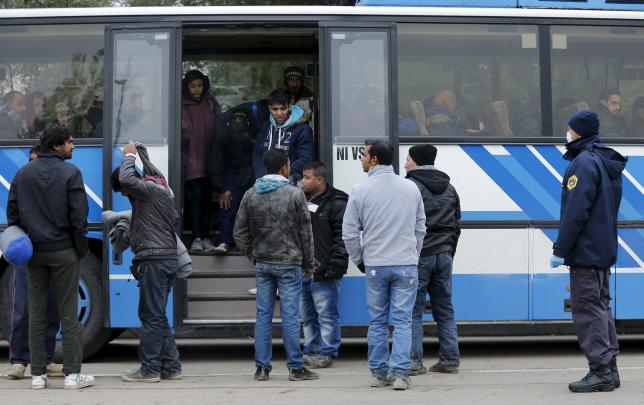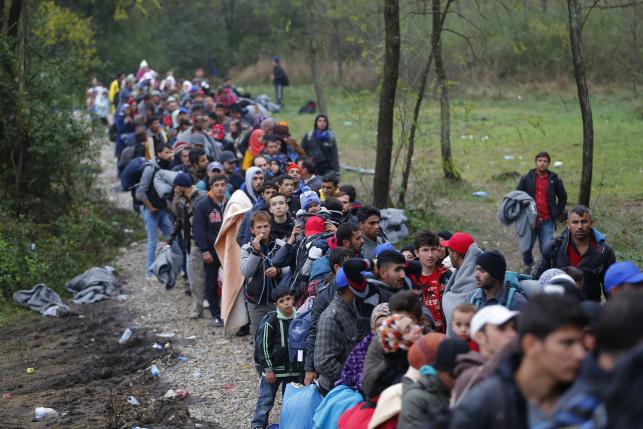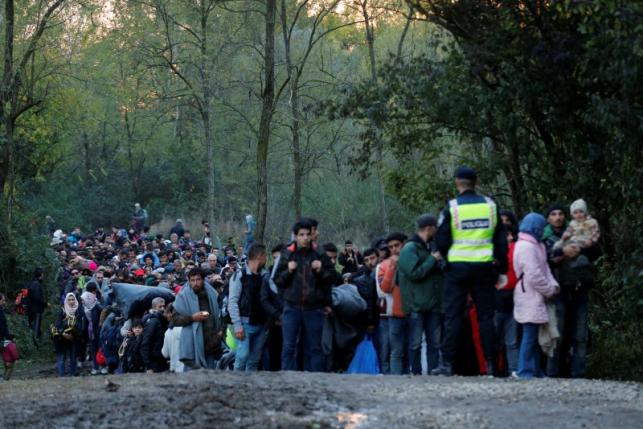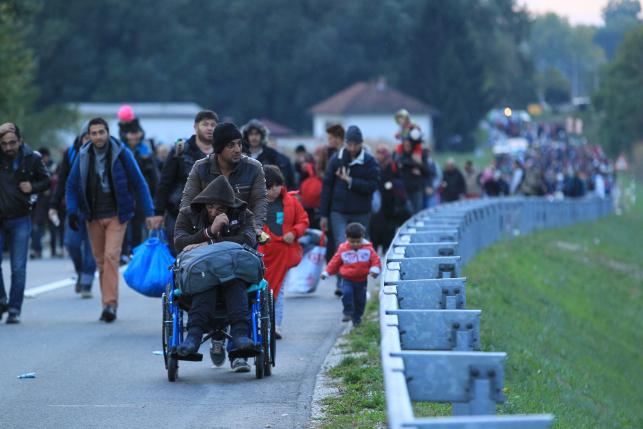www.aljazeerah.info
News, October 2015
Archives
Mission & Name
Conflict Terminology
Editorials
Gaza Holocaust
Gulf War
Isdood
Islam
News
News Photos
Opinion Editorials
US Foreign Policy (Dr. El-Najjar's Articles)
www.aljazeerah.info
|
Editorial Note: The following news reports are summaries from original sources. They may also include corrections of Arabic names and political terminology. Comments are in parentheses. |
Eviction of Sunni Muslim Arabs from Syria and Iraq to Germany Continues Despite Some Resistance in Eastern Europe
October 18, 2015
Editor's Note:
The NATO-Russian-Iranian Alliance continues its relentless air and land campaigns to evict Sunni Muslim Arabs from Syria and Iraq, particularly the Euphrates region. So far, about ten million Sunni Muslim Arabs have fled the region as a result of these fierce campaigns, which resulted in the destruction of whole cities and communities in the region, with an estimate of about 250,000 deaths.
While the formal excuse is fighting opposition groups and the Islamic State, the ultimate apparent goal is the eviction of Sunni Muslim Arabs from this region, in preparation for the expansion of Israel, from the Nile to the Euphrates:
A
background about how Israel is behind the destruction of the Middle
East:
 |
 |
 |
 |
Top right: Syrian refugees enter a bus at a Croatia-Slovenia border crossing in Lendava, Slovenia October 17, 2015.
The other three photos: Syrian refugees at the Hungary border after arriving by bus through Croatia, October 16, 2015.
Migrant backlog builds in Balkans after new diversion
Reuters Sun Oct 18, 2015 9:12am EDT
Serbia | By Aleksandar Vasovic
A column of around 40 buses packed with migrants queued to enter Croatia from Serbia on Sunday, their passage to western Europe slowed by a new diversion through Slovenia as weather conditions worsen.
Many had spent the night on the buses, wrapped in warm clothes and blankets against the autumn cold. They woke to dense fog.
“This part of the trip has lasted 20 hours, and we’ve been here for almost 12 hours,” said Khair, 40, a former sales manager from the Syrian capital, Damascus. “What can we do? We’re here and we have to wait.”
Hungary sealed its southern border with Croatia to migrants at midnight on Friday, forcing them west to fellow EU member Slovenia, a small former Yugoslav republic of two million people that also borders Austria.
Some 3,000 entered Slovenia on Saturday, en route to Austria and Germany, the favored destination of the vast majority, many of them Syrians fleeing war.
But Slovenian authorities said they planned to limit the influx to around 2,500 per day in line with the country's capacity to register and accommodate them.
That threatened to create a backlog in Croatia and Serbia which in recent weeks have seen upwards of 5,000 crossing their borders every day.
Aid agencies are concerned about backlogs building in the Balkans, lashed by autumn winds and rain and with winter on its way.
Croatia and Slovenia have both said they will not stop migrants from crossing, providing Austria and Germany also keep their doors open.
The EU has agreed a plan, resisted by Hungary and several other ex-Communist members of the bloc, to share out 120,000 refugees among its members.
That is only a small proportion of the 700,000 migrants expected to reach Europe’s shores by boat and dinghy from North Africa and Turkey this year, many of them fleeing war and poverty in the Middle East, Africa and Asia.
The influx has exposed deep divisions within Europe, with Hungary’s right-wing government taking a hard line against mainly Muslim migrants who it says pose a threat to the prosperity, security and “Christian values” of the continent.
The EU has proposed giving Turkey 3 billion euros ($3.4 billion) in aid and the prospect of easier travel visas and “re-energized” talks on joining the bloc if it helps stem the flow across its territory.
(Additional reporting by Marja Novak in LJUBLJANA; Writing by Matt Robinson; Editing by Mark Potter)
Czechs under fire for harsh, lengthy migrant detentions
Reuters Sunday, October 18, 2015 7:02am EDT
Czechs under fire for harsh, lengthy migrant detentions
By Robert Muller
When two young Syrian refugees crossed the Czech border from Slovakia in a smuggler's car last month they thought their dangerous 24-day journey to Germany would be over in hours.
Instead the 23-year old childhood friends were arrested, handcuffed, strip-searched and detained for six weeks by Czech authorities, with only sporadic access to legal aid or interpreters and little chance to contact families.
"They handcuffed us and took us to a police station somewhere underground," said one of the Syrians using the nickname Ramez. "They told us that we entered the country without a visa and that it would take only a couple of hours. In the end it was 40 days."
Their experience has been shared by hundreds of others subject to strict immigration policies enforced by the Czech authorities. Those complement a tough stance on immigration that has put the Czechs alongside Slovakia, Hungary and Romania on a collision course with more lenient EU partners led by Germany.
The country's public human rights officer said conditions some refugees were kept in, with poor sanitary conditions and little access to medical or legal assistance, were worse than in prisons.
The Czech Republic lies to the north of the main migration routes taking refugees through the Balkans to Germany. It has seen only a fraction of the hundreds of thousands passing through Hungary and Austria on their flight from war or poverty.
Lengthy detention of those who come through the Czech Republic mostly ends with their release with an order to leave the country, raising questions over the usefulness of the policy. Rights groups say the harshness may be intentional, as a way of convincing migrants not to pass through the country.
The practice differs from the approach by Hungary or Austria which have been letting migrants pass through on their way to their ultimate destinations in Germany and other European countries further north and west.
"Police in other countries actually helped us, not like here. Why do Czech police behave like this, and in Austria they don't?" Ramez told Reuters upon release from the detention center in Vysni Lhoty in eastern Czech Republic.
He declined to give his real name out of ear for fear for family still in Syria but showed Reuters his Syrian passport.
Police took away their phones and money, he said, and authorities charged about 10 euros per day for bed and board.
Interior Minister Milan Chovanec defended the Czech policy, saying the existing law obliges police to detain people entering illegally and try to return them across the border.
"We are not a xenophobic country. On the other hand you need to realize that those people break the law: they entered Czech territory without valid documents," he told Reuters.
"They are not held that long, we try to return them to the nearest country, in line with European law. We return them to Austria within seven days. The problem is that Greece or Hungary do not accept people back, so they stay for 40 days."
Some are held longer, aid workers said, as the law allows for up to 90 days of detention. There were 533 people detained in the country's three longer-term centers as of this past week.
The detentions apply to the vast majority of migrants who have either claimed asylum elsewhere or plan to do so only in Germany. Just 1,115 people claimed asylum in the Czech Republic this year, half of them Ukrainians and just 73 of them Syrians.
Some 170,000 irregular migrants entered the EU in September alone, taking the total for the year so far to 710,000. The Czechs have detected just 3,111 since June.
Ramez, who spoke to Reuters in a Prague hostel where he was taken by Czech aid workers on Oct. 15, said he and his friend would take a train to Germany within a day of their release.
WORSE THAN PRISON
The Czech Republic, a country of 10.5 million including about half a million foreigners but just a miniscule Muslim minority, has stood out in the EU along with Slovakia, Hungary and Romania in refusing quotas to share out asylum seekers across the EU.
The tough stance has backing from voters across the Czech political spectrum. President Milos Zeman was criticized for anti-Islamic views in a report released this week by the human rights body Council of Europe.
A survey by the CVVM agency found 50 percent of respondents were against taking in refugees, even from war zones.
The detention center where the two Syrians were held is among the better ones. Aid workers say conditions are worst in a center at Bela-Jezova, 50km (30 miles) north of Prague.
The country's Public Defender of Rights, Anna Sabatova, gave the site a damning evaluation after visits in August and October.
"The deepest trauma is caused by the fact that (detainees) don't know why they are there, for how long they will be there and what is their legal status," Sabatova said. "Conditions are in many aspects worse than in Czech prisons."
At the time of her August visit there were 700 people, including around 150 children, and 70 men were placed in a gym. Most have since been moved elsewhere to ease overcrowding.
Only bread rolls and cheese were distributed three times a day when Sabatova visited the camp. Many beds had neither sheets nor blankets, and there was a shortage of toiletries and diapers for children, her report said.
Five social workers were available for all the people. Medical assistance was provided by one doctor with two nurses.
A non-government group, Organization for Aid to Refugees (OAR), said among the detained was a Syrian family whose son suffered from asthma but did not receive proper medication. An ambulance was called for him several times, which the family had to pay for.
The facility is encircled by a double fence, the inner perimeter topped with razor wire, in the middle of a forest now covering a former training ground for Soviet troops that invaded Czechoslovakia in 1968 and stayed until 1991.
Reuters asked to visit Bela-Jezova but the authorities did not make a decision on the request.
TRYING TO IMPROVE, MINISTRY SAYS
Minister Chovanec acknowledged part of the criticism, for example a shortage of interpreters for the detainees who receive legal documents in Czech.
"We take the situation very seriously, but we are convinced that we are doing the maximum so that the people live there under standard, legal conditions," Chovanec told Reuters.
The government is opening more centers and adapting some for the needs of families to improve the situation, he said. Withholding phones and money is required by law, he said.
OAR director Martin Rozumek, whose staff visits Bela-Jezova regularly, said he believed the aim was to mistreat residents deliberately, to discourage other migrants from passing through the country.
"The living conditions, including guards using dogs during nighttime checks on people, bad food, bad hygiene conditions, dividing families, all that we think is against European law and undignified," he said.
"We are afraid that it won't get better, that it is part of the state policy to scare as many people as possible among those who might come in the future."
The length of detentions and treatment of those apprehended has run into opposition even at the government level.
"The only thing they committed is a misdemeanor, like when you park your car wrong. You don't expect to be locked up for 90 days," Justice Minister Robert Pelikan said on Czech Television.
The Czech Bar Association called on its members in September to assist migrants in legal issues. Stepan Holub from the Bar leadership said around 20 of his colleagues have volunteered.
"When we were in the camp, we hated the Czech Republic," said the Syrian Ramez. "Only when we saw people from a charity and the Red Cross at the train station, we found out that there are good people here as well."
(Additional reporting by Jason Hovet; Editing by Jan Lopatka and Peter Graff)
Bishops urge UK's Cameron to take in more Syrian refugees
Reuters, Sunday, October 18, 2015, 6:16am EDT
LONDON
A group of 84 Church of England bishops have written to British Prime Minister David Cameron urging him to increase the number of Syrian refugees the country will take in by 2020 to at least 50,000.
Under pressure from public opinion to strengthen Britain's response to the migrant crisis on Europe's borders, the government has pledged to take in 20,000 Syrian refugees over the next five years.
"We believe such is this country's great tradition of sanctuary and generosity of spirit that we could feasibly resettle at least 10,000 people a year for the next two years, rising to a minimum of 50,000 in total over the five year period you foresaw in your announcement," the bishops wrote.
"Such a number would bring us into line with comparable commitments made by other countries. It would be a meaningful and substantial response to the scale of human suffering we see daily."
Defense Secretary Michael Fallon said no country in Europe was doing more to help in camps in Syria.
"The real issue is out in Syria," he said on the Andrew Marr TV show on Sunday. "It's getting other countries in Europe to contribute more to the feeding of refugees in the camps and making sure their conditions are alleviated."
The letter from the bishops called on Cameron to consider involving the church in a national effort to "mobilize the nation as in times past."
A spokesman for Cameron's office did not respond directly to the content of the bishops' letter, but in response to a question about it said it was "absolutely right that Britain should fulfill its moral responsibility to help the refugees."
"But in doing so, we must use our head and our heart by pursuing a comprehensive approach that tackles the causes of the problem as well as the consequences," the spokesman said.
The Church of England sent a copy of the letter to media with a statement.
The bishops offered to rally congregations behind efforts to make rental properties and spare housing available to refugees, and to promote foster care for unaccompanied and homeless children.
The Church of England said in the statement that the bishops had written to Cameron in early September.
"It is disheartening that we have not received any substantive reply despite an assurance from the prime minister that one would be received," said Paul Butler, the bishop of Durham, in a statement.
"There is an urgent and compelling moral duty to act, which we as bishops are offering to facilitate alongside others from across civil society."
(Reporting by Estelle Shirbon and Paul Sandle; Editing by Matthew Lewis and Mark Potter)
Uproar over German fireman who set asylum shelter ablaze
Reuters, Tuesday, October 13, 2015, 10:07am EDT
By Tina Bellon
German politicians are expressing outrage over the case of a fireman who has admitted to setting an asylum shelter ablaze and been allowed to walk free pending charges.
No one was hurt in the arson attack in the small town of Altena south of Dortmund. Seven Syrians who had arrived the day before, including a pregnant woman, escaped injury after neighbors noticed the blaze and alerted them.
But some politicians say the case has cast an unfavorable light on how German authorities are responding to a rash of shelter burnings across the country.
Germany, a favored destination for refugees fleeing war in the Middle East, expects a record 800,000 to a million asylum seekers to arrive in the country this year.
Many Germans have welcomed the influx, donating clothes, helping at shelters and even opening their homes to refugees.
But others are dead-set against Chancellor Angela Merkel's welcoming stance. German federal police have counted 26 arson attacks on refugee shelters in the first nine months of the year. The Amadeu Antonio Foundation, a group that campaigns against right-wing extremism, puts the number at 70.
Yet only one person, in the northern town of Luebeck, has been convicted of an arson attack on a shelter this year. That person was given two years' probation.
The Altena case has attracted attention in part because the 25-year-old man behind the attack was a local fireman.
Prosecutors say he has admitted to entering the house, climbing to the attic and dousing it with gasoline before lighting the fire. In explaining his actions, he said he was scared about refugees living in his neighborhood.
An accomplice who acted as a look-out later turned himself in to police and told them of the fireman's role. Because of the fire, the refugees have been forced to leave the town.
Local prosecutor Bernd Maas told Reuters he had decided to charge the men with arson rather than attempted murder or a political hate-crime, which carry tougher penalties, because he didn't believe they had meant to hurt anyone.
"They certainly had xenophobic motives but since they are not part of the right-wing extremist scene, there was no reason to treat this as a politically motivated case," Maas said.
"They didn't want to kill anyone and the suspect in his capacity as a firefighter was aware that setting fire to the attic would not hurt anybody."
A number of politicians have condemned that approach, saying it could set a dangerous precedent.
Dirk Wiese, a member of the center-left Social Democrats (SPD) who sits in the German parliament in Berlin, called the prosecutor's assessment unacceptable.
"The offender shared a number of posts from populist right-wing websites on his Facebook page. Two clicks online would have been sufficient to determine his political motives," Wiese said.
Omid Nouripour, a lawmaker from the Greens party, called the prosecutor's decision "absurd" and said there was no doubt in his mind that the attack had been politically motivated.
(Reporting by Tina Bellon; Editing by Noah Barkin and Tom Heneghan)
Bavaria wants to send refugees back to Austria, Merkel says no
Reuters, Thursday, October 8, 2015, 5:17pm EDT
The German state of Bavaria plans "emergency measures" to slow arrivals of asylum seekers, including sending some back to neighboring Austria, state premier Horst Seehofer said, directly challenging Chancellor Angela Merkel over the crisis.
Seehofer says more than 225,000 refugees have arrived in his southern state in less than five weeks and authorities are stretched beyond the limit to house and care for them all.
The Bavarian cabinet will meet on Friday to agree the measures, although legally the state cannot send back refugees as this would be a matter for the federal government in Berlin, where Merkel has refused to cap the number of arrivals.
Seehofer told Bild newspaper that the meeting would examine how to integrate refugees. "On top of that will come specific self-defensive measures to limit migration, such as sending back people to the border with Austria and the immediate transfer of newly arrived asylum seekers within Germany," he said.
Vienna warned of the risk of violence if the government in Bavaria, the main entry point into Germany for asylum seekers moving north through the Balkans and Austria, went ahead with the plan.
"If refugees who wish to remain in Germany are sent back to Austria, then you have to expect riots ultimately," said Interior Minister Johanna Mikl-Leitner.
She was speaking after raising the issue with German Foreign Minister Frank-Walter Steinmeier and Interior Minister Thomas de Maiziere at a European Union meeting in Luxembourg. Both "are naturally very worried", she said.
Although in the same conservative parliamentary bloc, Seehofer is at loggerheads with Merkel on handling the refugee crisis as he insists that limits on numbers allowed into Germany are needed.
Merkel has made clear she will not introduce a refugee cap. "There will not be an entry stop," she told ARD television late on Wednesday.
Her Social Democrat (SPD) coalition partners have also dismissed the idea of limits. Vice chancellor and SPD chief Sigmar Gabriel said it was unrealistic to close the borders.
"We do not have a drawbridge we can lift," he said, adding refugees are fleeing Syria due to the dramatic situation there.
"Closing the borders - someone would have to tell us how that's supposed to work. Are we going to have the army there, with bayonets at the ready? Nobody would do that," he said, adding the causes of flight, hunger and misery had to be fought.
The refugee crisis is taking its toll on the popularity of Merkel's conservative Christian Democrats (CDU) and also their Bavarian sister party, the Christian Social Union (CSU), which Seehofer leads.
(Reporting by Madeline Chambers and Tom Körkemeier; Writing by David Stamp; Editing by Alison Williams)
***
Share this article with your facebook friendsFair Use Notice
This site contains copyrighted material the
use of which has not always been specifically authorized by the copyright
owner. We are making such material available in our efforts to advance
understanding of environmental, political, human rights, economic,
democracy, scientific, and social justice issues, etc. We believe this
constitutes a 'fair use' of any such copyrighted material as provided for
in section 107 of the US Copyright Law. In accordance with Title 17 U.S.C.
Section 107, the material on this site is
distributed without profit to those
who have expressed a prior interest in receiving the included information
for research and educational purposes. For more information go to: http://www.law.cornell.edu/uscode/17/107.shtml.
If you wish to use copyrighted material from this site for purposes of
your own that go beyond 'fair use', you must obtain permission from the
copyright owner.
|
|
|
|
||
|
||||||


